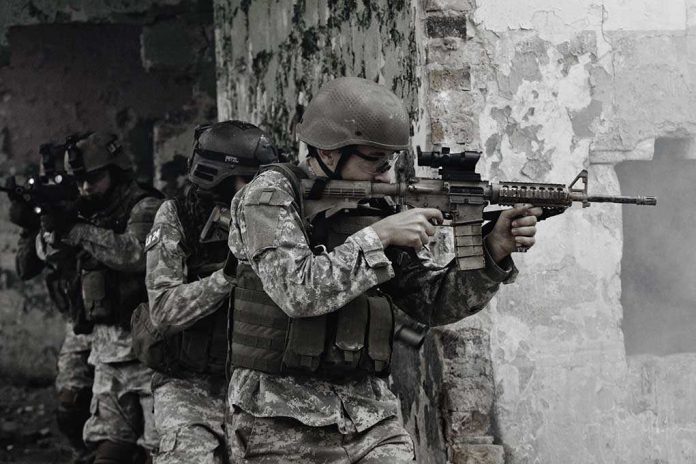
Somali pirates just pulled off their boldest hijacking in years—1,000 kilometers from home—only to have elite European special forces storm in, guns blazing, and rescue every crew member without a scratch.
Story Snapshot
- A Malta-flagged tanker, Hellas Aphrodite, hijacked by Somali pirates far from the coast triggers international alarm.
- All 24 crew members survive by locking themselves in a fortified citadel, outlasting hours of chaos and gunfire.
- Spanish special forces, part of the EU’s Operation Atalanta, board the vessel and free the crew in a textbook rescue.
- Experts warn this is the first successful commercial hijacking off Somalia in years, signaling a dangerous new chapter for global shipping.
Hijacking 1,000 Kilometers from Shore: How the Pirates Struck
Somali pirates, once synonymous with 2010s headlines, vanished from the world’s attention for years. That changed when the Hellas Aphrodite, loaded with gasoline bound for South Africa, found itself the target of a violent attack more than 1,000 kilometers from the Somali coast. Pirates, reportedly using a previously hijacked Iranian fishing boat as a mother ship, stormed the tanker with machine guns and rocket-propelled grenades. The crew, trained for such a nightmare, retreated into a fortified citadel as the pirates scoured the decks, unable to breach the stronghold. The world watched, holding its breath, as the pirates claimed their prize and international authorities raced to respond.
Word of the hijacking spread rapidly through maritime channels. UK Maritime Trade Operations issued urgent warnings as rumors swirled that the pirates might attempt more attacks. This was not just a distant spat between criminals and sailors—it represented the first successful commercial ship hijacking off Somalia since May, a chilling indicator that the threat, once thought contained, had returned with new reach and ambition.
Special Forces Storm the Tanker: A High-Stakes Rescue Unfolds
As the Hellas Aphrodite remained under pirate control, the Spanish Navy’s ESPS Victoria, operating as part of the EU’s anti-piracy Operation Atalanta, closed in. Special forces prepared for a surgical boarding, knowing that every second counted. Early Friday, commandos boarded the tanker, moving swiftly to secure the ship and reach the crew. The pirates, caught off-guard by the overwhelming response, fled or were neutralized. Not a single crew member was harmed. The rescue underscored the effectiveness of international naval cooperation and the critical importance of well-drilled security protocols like citadels and emergency alarms.
Statements from the private security firm Diaplous Group and EU naval officials confirmed the clean rescue. The Hellas Aphrodite was safe, but the operation sent shockwaves through the shipping industry, which relies on predictable sea lanes and the assurance that threats like Somali piracy remain under control.
Why Somali Piracy Is Back—and Why It Could Get Worse
Somali piracy, once a $7 billion-a-year scourge with hundreds of attacks annually, faded after 2011 thanks to international naval patrols and tough industry security standards. But the roots of piracy—regional instability, economic desperation, and weak governance—never truly vanished. In the past year, the Red Sea crisis and Houthi attacks have forced naval resources to divert, creating new gaps for pirates to exploit.
The Hellas Aphrodite incident is a warning shot. Seven piracy incidents have been reported off Somalia this year alone, including attacks on fishing boats and other commercial vessels. Pirates are operating further from shore, using hijacked vessels as mother ships, and showing new sophistication in their tactics. For shipping companies, that means rising insurance costs, rerouted journeys, and a return to protocols many hoped were relics of the past.
What Comes Next: A New Test for Global Shipping and Security
Maritime security experts now warn that if the world’s attention drifts, the problem will only escalate. The success of the Hellas Aphrodite rescue is a testament to the value of international cooperation, but it’s also a reminder that pirates adapt quickly, exploiting every gap in the world’s defenses. For Somali coastal communities, piracy is a double-edged sword—bringing both stigma and, for some, the only viable economic opportunity in a region still wracked by instability.
Shipping giants and insurers are watching closely. Every new hijacking, every crew forced into a citadel, sends ripples through the global economy. As pressure mounts on the EU, the US, and regional governments to up their maritime security game, common sense dictates that only a blend of force, vigilance, and political will can keep the world’s sea lanes open. The story of the Hellas Aphrodite is far from over—it’s the opening act in a new era of maritime cat-and-mouse, as old adversaries meet in the high seas with billions at stake.



